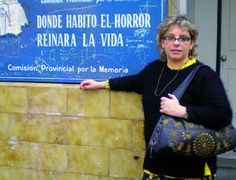Article published in the special Newsletter '15 years of PBI', October 2009
Francesca Nugnes, volunteer from Italy (2008-9)
As a result of continuous threats, the founders of the Manuel Cepeda Vargas Foundation have to leave Colombia. Psychologist Claudia Girón remembers the four years of exile in France.
Claudia Girón co-founded the «Manuel Cepeda Vargas Foundation» with Iván Cepeda. PBI has been accompanying Claudia since 1998. From its inception in 1994, the Foundation has been dedicated to an untiring work for justice. Its work is based on the conviction that progress in the fight against impunity in Colombia essentially depends on the action of the victims. Amongst the many fruits of its activities, particular mention should be given to: the promotion of several processes of historical memory and truth about crimes against humanity; strong support to the organisation and public visibility of victims of such crimes; contribution to the recognition of state responsibility in the genocide perpetrated against the Patriotic Union; and the undertaking of extensive work to disseminate information about human rights in the mass media. Claudia, as well as working for the Foundation, is a Lecturer in Psychology at the Javeriana University.
PBI: Why did you and Iván Cepeda decide to go into exile and how do you view that period?
Claudia Girón: In 1998 we began to receive serious threats because we had managed to bring the military officials implicated in the assassination of Manuel Cepeda, Iván’s father, to justice. In April 2000 we left the country. We had to leave to lower the tension. With the help of Amnesty International and the Catholic University of Lyon, we managed to obtain two scholarships to study at postgraduate level for two years. Exile is always tough but in our case the first two years were well invested. The idea was always to return. However, when we were going to return in 2002, they told us that there were no guarantees for our return. This was because Carlos Castaño had made public threats and had accused us of being part of the Manuel Cepeda Front of the FARC in Bogotá. They said that it was best not to go back. That was the most difficult period because we were no longer students and we had to work very hard.
PBI: How was the return to Colombia after four years in exile?
CG: We returned in April 2004. The return was very liberating because we wanted to return. Exile is not only about survival and being forced to leave, it is also about how your countrymen and women are. It’s very painful. Networks are broken up and families are separated. Fear provides is the reason for not returning and people live in a bubble of nostalgia and sadness. In many cases they never adapt to the new societies and they do not feel a part of a new world, they feel isolated. Exile is a very complicated condition existentially. As a psychologist I am very aware of the problem of affectation, culture and family links; of how hard it is to have been somebody in your country and to arrive in a country arrive in a country where one becomes monothematic, because you only speak about the little you know. There are some cases of people who have successfully integrated and contributed to the new society without forgetting who they are and without forgetting their pasts. This has a lot to do with individual attitudes and with the challenge of remaining the same person but learning to be different.
PBI: How did the accompaniment with PBI begin and how do you see it?
CG: PBI began to accompany us on an ad hoc basis in 1998-1999. When we returned in 2004 the accompaniment was more permanent. We began to work with other organisations on the positioning of the National Movement for Victims of State Crimes with respect to the Justice and Peace Law, which we view as a law that excludes the victims. From 2004 onwards we have been accompanied by PBI, above all when we travel to other regions, but sometimes also in Bogotá. The work of PBI is fundamental in making us feel relaxed and safe. Above all, going to the regions with PBI gives us a lot more security.
PBI: What is the biggest challenge facing national and international organisations?
CG: The biggest challenge at the moment is confronting the State’s tactics of stigmatisation to delegitimise both our work and yours. The challenge is to generate much more legitimacy. In your case I believe that it is important to raise the cost of the State’s attitude, discrediting people who are doing serious work and who have no nothing to do with any illegal or armed action.
Colombian NGOs have not acted forcefully enough over the chuzadas1. It’s scandalous. The State is lecturing us on legitimacy through illegitimate actions, for example, defamation, slander and illegal interceptions, which are punishable under national and international law.
1 Claudia Girón refers to the illegal monitoring carried out by the Department of Administrative Security (DAS), for more information, see article page 50

